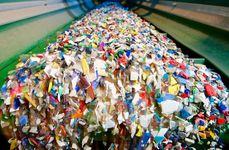
Arbeiten am Stoffstrombild Kunststoffe in Deutschland 2023 gestartet
Für die Studie werden in den kommenden Monaten wieder verschiedene Statistiken ausgewertet und als Kernstück mehr als 2.000 Unternehmen der Kunststoffherstellung, -verarbeitung und -verwertung befragt. Die neue Stoffstromanalyse für Kunststoffe in Deutschland 2023 mit Daten zu Produktion, Verarbeitung, Verbrauch, Abfallaufkommen und Verwertung von Kunststoffen erscheint voraussichtlich im September 2024.
Weiterlesen … Arbeiten am Stoffstrombild Kunststoffe in Deutschland 2023 gestartet
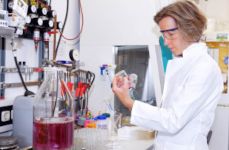
Tiefseeenzym zersetzt PET
Forscherinnen und Forscher der Universitäten Kiel, Hamburg und Düsseldorf haben mit Hilfe komplexer Analysemethoden in einer Datenbank mit Wasserproben aus aller Welt ein Enzym identifiziert, das aus Urzeitbakterien, sogenannten Archaeen in der Tiefsee vor Venezuela stammt. Das neu entdeckte Enzym PET46 soll anders als die bisher bekannten Biokatalysatoren mit der Fähigkeit, Kunststoff abzubauen, warme Temperaturen aushalten und den Kunststoff Polyethylenterephthalat (PET) daher schneller aufspalten können. Diese Besonderheit und weitere biochemische Eigenschaften machen PET46 laut Forscherteam zu einem sehr interessanten Kandidaten für den Kampf gegen die Plastikverschmutzung sowohl im Meer als auch an Land.
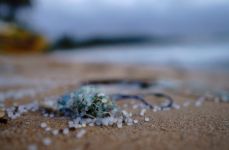
Studie: Mögliches Potential zur Mikroplastik-Freisetzung durch Recycling
Laut einer Pilotstudie eines Wissenschaftlerteams von der schottischen Universität Strathclyde in Zusammenarbeit mit Universitäten in Kanada, Großbritannien und Neuseeland besteht ein Potential dafür, dass Mikroplastik in der Umwelt aus dem Recycling von Kunststoffabfällen stammt. Das Forschungsteam folgerte aus den Ergebnissen einer Untersuchung, dass Kunststoffrecyclinganlagen neben dem Straßenverkehr ein bedeutsamer Verursacher der planetaren Mikroplastikverschmutzung sein könnten und das Recycling von Kunststoffabfällen grundsätzlich in Frage zu stellen sei. Um die Messergebnisse an der in Schottland untersuchten singulären Anlage sowie die Schlussfolgerungen aus der Studie einzuordnen, werden aktuelle Studienergebnisse der BKV zu Pelletverlusten in der Industrie in Deutschland betrachtet.
Weiterlesen … Studie: Mögliches Potential zur Mikroplastik-Freisetzung durch Recycling
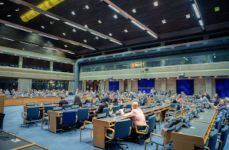
Wenige Fortschritte beim UN-Plastikabkommen – Hersteller fordern verstärkte Anstrengungen für INC-4
Die Mitgliedstaaten der Vereinten Nationen wollen der Umweltverschmutzung durch Plastikabfälle bis 2040 ein Ende setzen. Zur dritten Sitzung des zwischenstaatlichen Verhandlungsausschusses zur Ausarbeitung eines internationalen rechtsverbindlichen Instruments zur Bekämpfung der Plastikverschmutzung (INC-3) vom 13. bis 19. November 2023 am Sitz des UN-Umweltprogramms (UNEP) in Nairobi, Kenia, lag ein erster Entwurf für das Abkommen vor. Eine Einigung über nächste Schritte zur Ausarbeitung des Abkommens kam jedoch in Nairobi nicht zustande. Größter Streitpunkt ist, ob das Abkommen eine Begrenzung der Kunststoffproduktion vorsehen sollte.
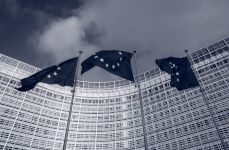
Beschränkung von Mikroplastik und Pelletverlusten
Der Verkauf von Produkten mit zugefügtem Mikroplastik oder solchen, die bei Gebrauch Mikroplastik freisetzen, wird in der EU schrittweise verboten. In einem ersten Schritt wurde der Verkauf von Kosmetika mit losem Glitter oder Mikroperlen untersagt. Für andere Produkte – zum Beispiel Kunststoffgranulate, die auf Sportplätzen verwendet werden – gelten Übergangsfristen. In Vorbereitung sind zudem Vorgaben der Europäischen Kommission zur Beschränkung von Pelletverlusten in den kunststoffverarbeitenden Unternehmen, die zum Beispiel während des Transports von Kunststoffgranulaten vorkommen können.
Weiterlesen … Beschränkung von Mikroplastik und Pelletverlusten

Interview mit MKV-Geschäftsführer Rainer Zies zur Vermeidung von Pelletverlusten
Rainer Zies ist Geschäftsführer der im hessischen Beselich-Obertiefenbach ansässigen MKV GmbH Kunststoffgranulate, einem mittelständischen familiengeführten Unternehmen, das auf das Recycling und Compounding von Altkunststoffen aus technischen Anwendungen spezialisiert ist. Im Vorstand des TecPart Verband Technische Kunststoff-Produkte e.V. engagiert sich Rainer Zies für die Branche und vertritt die Interessen in Öffentlichkeit und Politik sowie in nationalen und europäischen Gremien. Darüber hinaus ist Rainer Zies Mitglied des Technischen Ausschusses (TA) der BKV GmbH und des Nachhaltigkeitsausschusses der IHK Frankfurt. Schließlich arbeitet er an normativen Grundlagen für das mechanische Recycling von Kunststoffen in einer Gruppe des DIN, dem Fachnormenausschuss Kunststoff. Dort ist er einer der Co-Autoren der DIN SPEC 91446, die Qualitätsniveaus für Kunststoffrezyklate beschreibt.
Weiterlesen … Interview mit MKV-Geschäftsführer Rainer Zies zur Vermeidung von Pelletverlusten
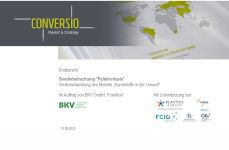
BKV-Veranstaltung: „Kunststoffe in der Umwelt – im Fokus Pelletverluste“
Am 30. November 2023 führte die BKV GmbH eine Online-Veranstaltung durch, um zum einen über Daten, Fakten und Maßnahmen zur Vermeidung von Pelletverlusten zu informieren und zum weiteren über Maßnahmen entlang der Kunststoff-Wertschöpfungskette zu diskutieren. Pelletverluste in Deutschland sind im Rahmen einer Studie der Conversio Market & Strategy GmbH im Auftrag der BKV, die als „Sonderbetrachtung Pelletverluste“ veröffentlicht wurde, näher untersucht worden. Die Ergebnisse dieser Studie wurden im Rahmen der Veranstaltung vorgestellt.
Weiterlesen … BKV-Veranstaltung: „Kunststoffe in der Umwelt – im Fokus Pelletverluste“
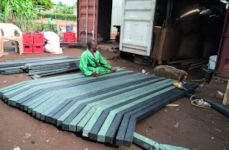
Plasticpreneur will Kunststoffrecycling weltweit fördern
Das Ziel des österreichischen Social & Green Tech-Unternehmens Plasticpreneur GmbH mit Sitz in Klagenfurt ist es, einen niederschwelligen und kostengünstigen Zugang zum Recycling von Kunststoffen zu schaffen. Dazu hat das im Januar 2020 gegründete Unternehmen small-scale Kunststoffrecyclingmaschinen und Werkzeuge entwickelt, die den Angaben zufolge weltweit zum Einsatz kommen.
Weiterlesen … Plasticpreneur will Kunststoffrecycling weltweit fördern
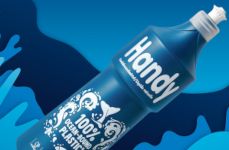
Flasche aus Meeresplastik für Migros-Spülmittel
Die Flasche des Spülmittels „Handy Fresh Ocean“ von Migros – dem größten Einzelhandelsunternehmen der Schweiz – wird laut Hersteller aus Kunststoffabfall produziert, den die Schweizer Firma tide ocean SA in Küstengebieten sammelt. Dieser wird sortiert, gereinigt und zu einem Kunststoffgranulat verarbeitet. Das daraus erzeugte Material kommt den Angaben zufolge bei der Herstellung neuer Produkte wie der Handy Fresh Ocean Flasche zum Einsatz.
Weiterlesen … Flasche aus Meeresplastik für Migros-Spülmittel
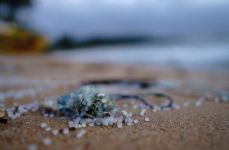
OCS®-Zertifizierung zur Vermeidung von Granulatverlusten
„Operation Clean Sweep®“ (OCS) ist ein internationales Programm der Kunststoffindustrie, das sich dafür einsetzt, den Verlust von Kunststoffgranulat, -flakes und -pulver zu vermeiden und sicherzustellen, dass diese Materialien nicht in die Umwelt gelangen. Das mit Februar 2023 in Kraft getretene freiwillige europäische OCS®-Zertifizierungssystem soll nun harmonisierte Prozesse und Verfahren zur Kontrolle und Dokumentation von Granulatverlusten in der gesamten Kunststofflieferkette schaffen. Ein gemeinsames Webinar von Plastics Europe Deutschland, KunststoffSwiss und TÜV Nord mit Unterstützung der BKV informierte über die Grundlagen der OCS®-Zertifizierung.
Weiterlesen … OCS®-Zertifizierung zur Vermeidung von Granulatverlusten
